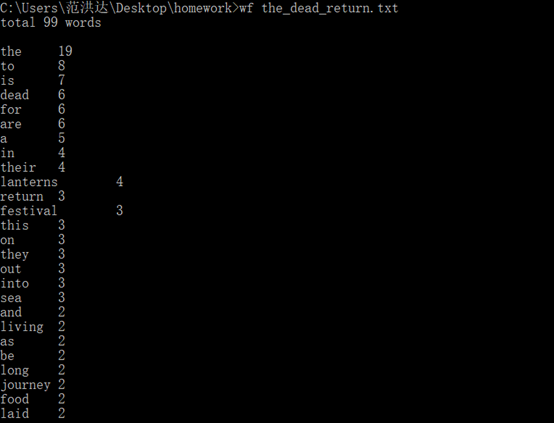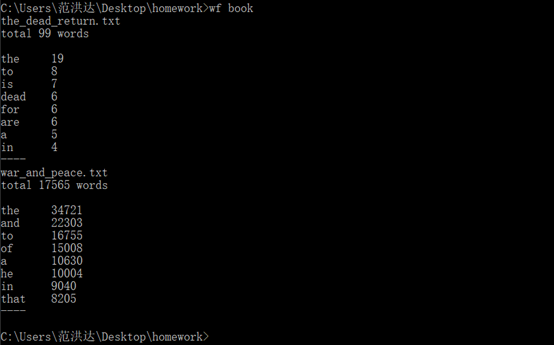第二周博客作业20180918-1
本次作业要求参见https://edu.cnblogs.com/campus/nenu/2018fall/homework/2126
本次作业代码地址https://git.coding.net/fanhongda/test.git
发表博客,介绍上述“项目”中每个功能的重点/难点,展示重要代码片断,给出执行效果截图,展示你感觉得意、突破、困难的地方。
功能1
(1)读取文件
char* readFile(const char* filename){ char* passage; FILE* fp; char buf[1024]; fp = fopen(filename,"r"); if(fp==NULL){ exit(-1); } passage = (char*)malloc(sizeof(char)*MAXLENGTH); passage[0]='\0'; while(!feof(fp)){ fgets(buf,1024,fp); strcat(passage,buf); } return passage; }
(2)把整篇文章切割成单词,为了避免同一个单词因为大小写的原因而识别为两个单词,因此把大写字母换成小写
char** split(char* passage,int *size){ int i; int len = strlen(passage); int c = 0,num=0; char **words,*word; words = (char**)malloc(sizeof(char*)*MAXWORDS); word = (char*)malloc(sizeof(char)*MAXWORD); for(i=0;i<len;i++){ if(!isChar(passage[i])){ passage[i]=' '; }else if(isUpper(passage[i])){ passage[i]=(char)('a'+passage[i]-'A'); } } len = strlen(passage); passage[len]='\0'; len++; for(i=0;i<MAXWORDS;i++){ words[i]=(char*)malloc(sizeof(char)*MAXWORD); } for(i=0;i<len;i++){ if(passage[i]!=' '&&passage[i]!='\0'){ word[c++]=passage[i]; }else{ if(c>0){ word[c]='\0'; c=0; strcpy(words[num++],word); } } } //记录单词的数量 *size = num; return words; }
(3)按照单词出现频率进行排序
void sort(Data* datas,int size){ int i,j; Data t; for(i=0;i<size;i++){ for(j=0;j<size-i-1;j++){ if(datas[j].count<datas[j+1].count){ t = datas[j]; datas[j]=datas[j+1]; datas[j+1] = t; } } } }
(4)存储单词和出现频率的结构体
typedef struct Data{ char* word; int count; }Data;
(5)小文件输入,在控制台输入命令
void function1(char* filename){ char* passage; char** words; Data* datas; int total = 0; int i,j,size=0; int exist=0; datas = (Data*)malloc(sizeof(Data)*MAXWORDS); passage = readFile(filename); words = split(passage,&size); for(i=0;i<size;i++){ exist=0; for(j=0;j<total;j++){ if(strcmp(datas[j].word,words[i])==0){ exist = 1; break; } } if(exist){ exist=0; datas[j].count+=1; }else{ datas[total].word = malloc(sizeof(char)*MAXWORD); strcpy(datas[total].word,words[i]); datas[total].count=1; total++; } } sort(datas,total); printf("total %d\n\n",total); for(i=0;i<total;i++){ printf("%s\t%d\n",datas[i].word,datas[i].count); } }
运行截图

功能2
命令行输入作品文件名
void function2(char* filename){ char* passage; char** words; Data* datas; int total = 0; int i,j,size=0; int exist=0; datas = (Data*)malloc(sizeof(Data)*MAXWORDS); passage = readFile(filename); words = split(passage,&size); for(i=0;i<size;i++){ exist=0; for(j=0;j<total;j++){ if(strcmp(datas[j].word,words[i])==0){ exist = 1; break; } } if(exist){ exist=0; datas[j].count+=1; }else{ datas[total].word = malloc(sizeof(char)*MAXWORD); strcpy(datas[total].word,words[i]); datas[total].count=1; total++; } } sort(datas,total); printf("total %d words\n\n",total); for(i=0;i<total;i++){ printf("%s\t%d\n",datas[i].word,datas[i].count); } }
运行截图

功能3
命令行输入存有英文作品文件的目录名,虽然和功能2一样都是命令行输入,但功能2是文件功能3是文件夹
void _function3(char* foldername,char* filename){ char* passage; char** words; Data* datas; int total = 0; int i,j,size=0; int exist=0; char ffname[300]; datas = (Data*)malloc(sizeof(Data)*MAXWORDS); strcpy(ffname,foldername); strcat(ffname,"//"); strcat(ffname,filename); passage = readFile(ffname); words = split(passage,&size); for(i=0;i<size;i++){ exist=0; for(j=0;j<total;j++){ if(strcmp(datas[j].word,words[i])==0){ exist = 1; break; } } if(exist){ exist=0; datas[j].count+=1; }else{ datas[total].word = malloc(sizeof(char)*MAXWORD); strcpy(datas[total].word,words[i]); datas[total].count=1; total++; } } sort(datas,total); printf("%s\n",filename); printf("total %d words\n\n",total); total = total>8?8:total; for(i=0;i<total;i++){ printf("%s\t%d\n",datas[i].word,datas[i].count); } }
运行截图

功能4
从控制台读入单篇英文作品,将输出结果保存到指定文件中
void function4(char* words[],int size){ char* passage; Data* datas; int total = 0; int i,j=0; int exist=0; char temp[10000]; datas = (Data*)malloc(sizeof(Data)*MAXWORDS); passage = (char*)malloc(sizeof(char)*MAXLENGTH); passage[0]='\0'; while(scanf("%s",temp)!=EOF){ strcat(passage,temp); strcat(passage," "); } words = split(passage,&size); for(i=0;i<size;i++){ exist=0; for(j=0;j<total;j++){ if(strcmp(datas[j].word,words[i])==0){ exist = 1; break; } } if(exist){ exist=0; datas[j].count+=1; }else{ datas[total].word = malloc(sizeof(char)*MAXWORD); strcpy(datas[total].word,words[i]); datas[total].count=1; total++; } } sort(datas,total); printf("total %d words\n\n",total); for(i=0;i<total;i++){ printf("%s\t%d\n",datas[i].word,datas[i].count); } }
运行截图

此项目PSP

差异原因:没有实际编过程序,对所需时间并没有一个准确的认知,而且整个过程感觉速度缓慢,并且期间出现各种各样的小错误,修改它们花费了一些时间。如果再算上复习C语言的时间总时间将会更多,大约是1300分钟。


